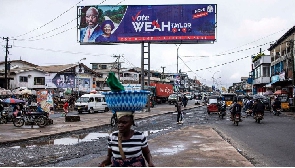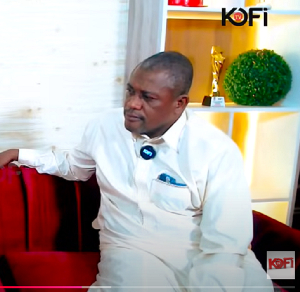Ex-international football star George Weah is running for a second term as Liberia's president in elections on Tuesday, with peace and development among voters' main concerns.
Under a tin roof by a petrol station in Buchanan, around 150 kilometres (93 miles) east of the capital Monrovia, a group of men discussed their priorities for the October 10 presidential and parliamentary polls.
They talked about better healthcare, education and roads, jobs and the cost of living. But in a country scarred by back-to-back civil wars, there was one overriding issue.
"What we expect most is peace," said Melvine Zoega, 37.
Between 1989 and 2003, the conflicts in the nation left more than 250,000 people dead.
The main political parties have pledged a peaceful vote, but the recent killing of three people in clashes between supporters of the two main political parties has fuelled fears of a return to violence.
"We advise to the youth, whoever is the winner, we should accept it. Whether it's our candidate or it's not," said David Tokpah, 55.
"The past war was dreadful. Many innocents died. We don't want that to happen again because we know where it took us for the past 14 years."
The authorities have vowed to track down troublemakers, while the electoral commission is seeking to reassure people it can organise fair and credible polls.
The EU, the African Union, the West African bloc Ecowas and US have deployed observers, in a region hit by a string of recent coups.
Development and corruption
Weah is facing 19 candidates, and a second round of voting is set for early November, unless a candidate secures an unlikely absolute majority in the first round.
Polling stations will open from 0800 to 1800 GMT, and the country's 2.4 million voters will also be choosing who takes up the 73 seats in the House of Representatives and the 15 members of the Senate.
The first results are expected within a few days of the vote.
Former vice president Joseph Boakai from the Unity Party is among the frontrunners for the presidency.
He has said that any vote cheating or manipulation will lead to "the end of this country".
Boakai, 78, is seeking revenge against the incumbent president, who beat him in the second round in 2017.
He has forged alliances including with former warlord and senator Prince Johnson, who has threatened a popular revolt if the ruling party manipulates the elections.
Boakai has pledged to restore the country's image, develop infrastructure and improve life for the poorest in Liberia.
More than a fifth of the population lives on less than $2.15 a day, according to the World Bank, and the price of staple foods has soared.
Boakai, who served as vice president between 2006 and 2018, presents himself as an honest alternative to Weah, whom he accuses of presiding over a corrupt system.
The United States has sanctioned five senior Liberian officials for alleged corruption in three years.
The watchdog Transparency International ranked Liberia 142nd of 180 countries in its 2022 corruption perceptions index.
'Man of the situation'
But corruption is not a key concern for George Mobo, in Monrovia's West Point slum.
"Look at African countries and tell me which country is not corrupt," the 30-year-old said.
Education, peace and creating jobs are his top priorities.
His friends agree, sitting near a brand-new football stadium, built under the president's watch.
"President Weah is the man of the situation. He built roads, made education free. And there was coronavirus for two years. Now he will do better," said John Seaton, 24.
Weah came to power in 2018 after winning an October 2017 election, capitalising on his iconic status acquired after becoming the first and only African to win football's most prestigious individual award, the Ballon d'Or, in 1995.
The ex-PSG, Monaco and AC Milan striker grew up in the slums of Monrovia and is popular with young people in a country where over 60 percent of the population is under 25.
The streets of the capital are plastered with posters showing him alongside his running mate Jewel Howard-Taylor, the ex-wife of jailed former president and warlord Charles Taylor.
His party, the Congress for Democratic Change, has been holding street processions with loudspeakers blasting music praising Weah.
Along with Boakai, Weah's main rivals are former Coca-Cola executive and philanthropist Alexander Cummings and human rights lawyer Tiawan Gongloe. The results they secure could be decisive in the run-off.
Africa News of Friday, 6 October 2023
Source: theeastafrican.co.ke

















